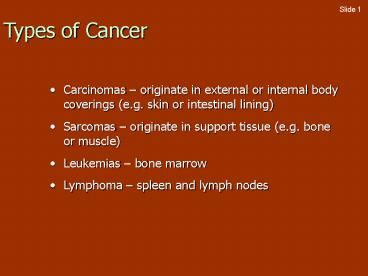Types of Cancer - PowerPoint PPT Presentation
1 / 26
Title:
Types of Cancer
Description:
Somatic cells typical body cells. 46 chromosomes in 23 ... White coat (c); pink eyes (e) Slide 12. Coat-color. genes. Eye-color. genes (homologous pair of ... – PowerPoint PPT presentation
Number of Views:214
Avg rating:3.0/5.0
Title: Types of Cancer
1
Types of Cancer
- Carcinomas originate in external or internal
body coverings (e.g. skin or intestinal lining) - Sarcomas originate in support tissue (e.g. bone
or muscle) - Leukemias bone marrow
- Lymphoma spleen and lymph nodes
2
Chromosome arrangement
- Somatic cells typical body cells
- 46 chromosomes in 23 pairs (humans)
- Each pair is called homologous chromosomes
- Gametes sex cells
- 23 chromosomes
3
Homologous chromosomes
- 22 of the pairs (autosomes) are true homologues
- One of each came from mom and dad
- Identical in length and type of genes carried
- Genes on each are slightly different
- Sex chromosomes (23rd pair) dont match up
exactly (X vs Y)
4
(No Transcript)
5
Meiosis
- Produces haploid cells
- Results in four daughter cells
- All are haploid
- All are genetically unique from each other and
from the parent - DNA replicated before meiosis begins
- Two stages
- Meiosis I separates homologous chromosomes
- Meiosis II separates sister chromatids
6
(No Transcript)
7
(No Transcript)
8
(No Transcript)
9
Sexual Reproduction leads to genetic variation
- 3 process that contribute to variation
- Crossing over during prophase I
- Orientation of homologues during metaphase I
- Random fertilization
10
Tetrads ? 4 gametes
11
(No Transcript)
12
(No Transcript)
13
(No Transcript)
14
(No Transcript)
15
Crossing Over
16
Karyotype
Centromere
Sister
chromatids
Pair of homologous
chromosomes
2,600?
17
Alterations in Chromosome Number
- Nondisjunction when a pair of chromosomes fail
to separate - Meiosis I when homologs fail to separate
- Meiosis II when sister chromatids fail to
separate - Can happen in autosomes or sex chromosomes
18
(No Transcript)
19
(No Transcript)
20
Alterations in Chromosome Number
21
Alterations in Chromosome Number Autosomes
22
Down Syndrome
- Nondisjunction in chromosome 21
- AKA trisomy 21
- Results in 47 chromosomes (instead of 46)
- Affects 1 in 700 births
- Incidence increases dramatically with age of
mother
23
(No Transcript)
24
Alterations in Chromosome Number Sex Chromosomes
25
(No Transcript)
26
(No Transcript)

